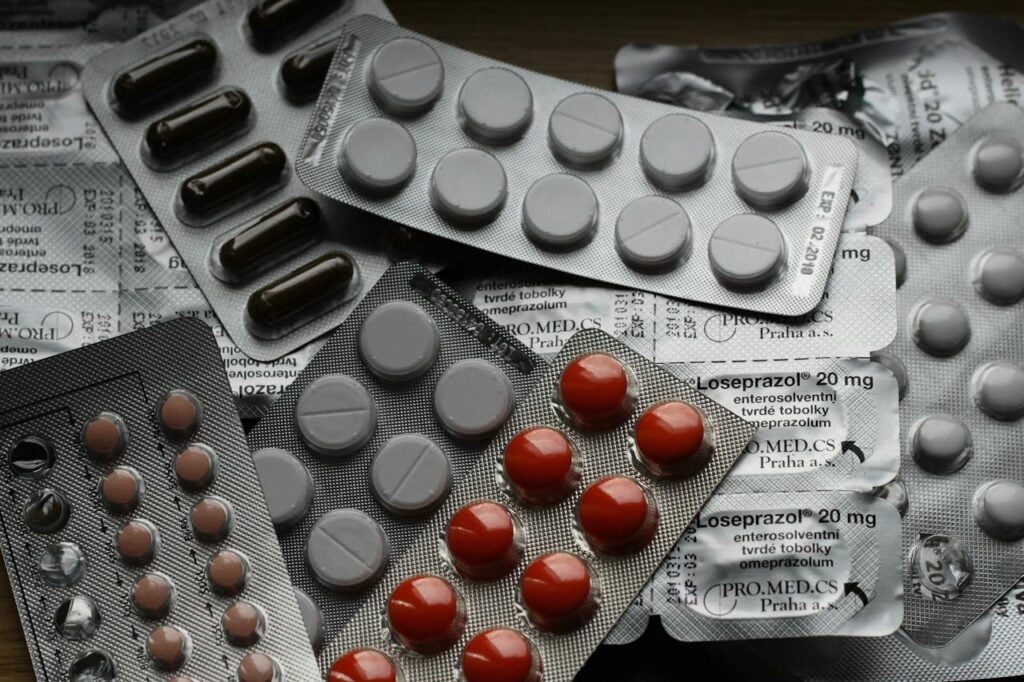Welcome to our comprehensive guide on “Navigating Common Men’s Sexual Health Concerns: Causes and Solutions.” In this informative blog post, we will explore the prevalent sexual health issues that men often face, and provide insights into their underlying causes and effective solutions. From understanding the factors contributing to these concerns to discussing diagnosis, treatment options, natural remedies, and preventive measures, we are here to help you on your journey to better sexual health. Whether you’re seeking to address concerns like erectile dysfunction, premature ejaculation, low libido, or simply want to maintain a healthy sexual life, this guide is designed to provide you with the knowledge and strategies you need to navigate and improve your sexual well-being.
Table of Contents
Understanding Common Men’s Sexual Health Concerns
When it comes to men’s sexual health, it’s essential to be well-informed about common concerns that can affect men of all ages. By understanding these issues, you can take steps to address them and improve your overall well-being. In this section, we’ll explore some of the most prevalent sexual health concerns that men face.
- Erectile Dysfunction (ED): One of the most widely recognized sexual health issues among men is erectile dysfunction. ED is characterized by the inability to achieve or maintain an erection sufficient for sexual intercourse. This concern can be caused by various factors, including age, underlying health conditions, stress, and lifestyle choices. Addressing the causes of ED is crucial for finding effective solutions.

- Premature Ejaculation: Premature ejaculation occurs when a man reaches orgasm and ejaculates too quickly during sexual activity. This condition can lead to frustration and dissatisfaction for both partners. It may be caused by psychological factors, relationship issues, or physical sensitivity.
- Low Libido: A reduced sex drive, often referred to as low libido, is a common sexual health concern in men. It can be associated with hormonal imbalances, stress, or psychological factors. Understanding the root causes of low libido is crucial for developing solutions.
- Sexually Transmitted Infections (STIs): STIs, such as chlamydia, gonorrhea, and syphilis, can affect men’s sexual health. It is essential to be aware of safe sexual practices and regular screenings to prevent and detect these infections.
- Prostate Problems: As men age, they may face prostate-related issues that can impact sexual health. Conditions like benign prostatic hyperplasia (BPH) or prostate cancer may affect urinary and sexual function.
Understanding these common men’s sexual health concerns is the first step toward finding effective solutions. In the subsequent sections, we will delve deeper into the causes and potential solutions for these issues, providing you with the knowledge you need to navigate and improve your sexual health.
Causes of Men’s Sexual Health Concerns
To effectively address men’s sexual health concerns, it’s crucial to delve into the underlying causes that can contribute to these issues. Understanding the root factors is the key to finding appropriate solutions. In this section, we will explore the various causes of common men’s sexual health concerns.

- Erectile Dysfunction (ED): The causes of erectile dysfunction can be multifaceted. They include both physical and psychological factors. Physically, ED can be a result of poor blood flow, nerve damage, hormonal imbalances, or side effects of medications. On the psychological side, stress, anxiety, depression, and relationship problems can all play a significant role.
- Premature Ejaculation: Psychological factors are often at the forefront of premature ejaculation. Anxiety, performance pressure, and relationship issues can contribute to this concern. Additionally, increased penile sensitivity may also play a role.
- Low Libido: Low libido can be associated with hormonal imbalances, such as low testosterone levels. It can also result from stress, fatigue, depression, or side effects of certain medications. I
- Sexually Transmitted Infections (STIs): The causes of STIs are typically due to unsafe sexual practices, such as unprotected intercourse. It’s important to emphasize the significance of safe sex and regular screenings for early detection.
- Prostate Problems: Prostate problems, like benign prostatic hyperplasia (BPH) or prostate cancer, often arise with age. They can affect urinary and sexual function. These conditions are typically linked to hormonal changes and genetic predisposition.
Exploring the causes of these common men’s sexual health concerns is essential for tailoring effective solutions. By addressing the root factors, you can make informed choices and work towards improving your sexual health. In the following sections, we will delve into diagnosis and medical evaluation, treatment options, and preventive measures to help you navigate these concerns effectively.
Diagnosis and Medical Evaluation
When faced with men’s sexual health concerns, seeking professional guidance is a critical step in understanding the issues and finding appropriate solutions. This section will guide you through the importance of diagnosis and medical evaluation for common men’s sexual health concerns.
- Erectile Dysfunction (ED): For men dealing with ED, a medical evaluation is vital to determine the underlying causes. Healthcare providers may perform physical examinations, review medical histories, and order specific tests, such as blood tests, to assess hormone levels or imaging to evaluate blood flow to the penis.
- Premature Ejaculation: While premature ejaculation is often diagnosed based on symptoms and patient history, medical evaluation may be necessary to rule out underlying conditions. Doctors can assess psychological factors and guide behavioural therapies or medications.
- Low Libido: A medical evaluation for low libido may involve a comprehensive health assessment, blood tests to check hormone levels, and discussions about contributing factors such as stress and relationship issues.
- Sexually Transmitted Infections (STIs): Diagnosis of STIs usually involves a physical examination, reviewing symptoms, and conducting specific tests, such as blood tests or swabs. Regular screenings can help detect and prevent the spread of these infections.
- Prostate Problems: A medical evaluation for prostate issues typically includes a physical examination, blood tests to measure prostate-specific antigen (PSA) levels, and, if necessary, a biopsy to confirm prostate cancer.
Professional diagnosis and medical evaluation are fundamental steps in addressing men’s sexual health concerns. By consulting with healthcare providers and undergoing the necessary tests, you can gain valuable insights into the causes of these issues and make informed decisions about treatment and management. In the following sections, we will explore treatment options, natural remedies, and preventive measures to further assist you in navigating and improving your sexual health.
Lifestyle Factors and Sexual Health
In the pursuit of better sexual health, lifestyle plays a pivotal role. Our daily habits, diet, and exercise can significantly impact our sexual well-being. Let’s explore how lifestyle factors can influence men’s sexual health.

- Diet and Nutrition: A balanced diet rich in nutrients is vital for sexual health. Specific nutrients like zinc, vitamin D, and omega-3 fatty acids are linked to improved sexual function. Conversely, excessive consumption of processed foods, sugary beverages, and high levels of saturated fats can contribute to sexual health concerns.
- Exercise and Physical Activity: Regular physical activity improves blood flow, reduces stress, and can boost testosterone levels. Exercise doesn’t need to be strenuous; even moderate activities like brisk walking can have a positive impact on sexual health.
- Smoking and Alcohol: Smoking and excessive alcohol consumption can harm sexual health. Smoking can impair blood flow, while heavy drinking can lead to sexual performance issues and reduced libido.
- Stress Management: Chronic stress can lead to sexual problems, including erectile dysfunction and reduced libido. Learning stress management techniques, such as mindfulness and relaxation exercises, can significantly improve sexual well-being.
- Sleep Quality: Inadequate or poor-quality sleep can disrupt hormonal balance and negatively impact sexual health. Ensuring a good night’s rest is essential for maintaining healthy sexual function.
- Weight Management: Maintaining a healthy weight is crucial for sexual health. Obesity can lead to hormonal imbalances and increase the risk of sexual concerns like erectile dysfunction.
Understanding the influence of lifestyle factors on men’s sexual health is a crucial step toward improving overall well-being. By making positive changes in diet, exercise, stress management, and other aspects of your lifestyle, you can enhance your sexual health and overall quality of life. In the following sections, we will delve into the psychological aspects of sexual health, treatment options, and natural remedies to provide a holistic approach to improving your sexual well-being.
Psychological Aspects of Sexual Health
Our mental and emotional well-being can have a profound impact on our sexual health. In this section, we’ll explore the psychological factors that play a significant role in men’s sexual well-being and how they can affect various aspects of sexual health.

- Stress and Anxiety: High levels of stress and anxiety can contribute to sexual health concerns, such as erectile dysfunction and premature ejaculation. When the mind is preoccupied with worries or fears, it can be challenging to engage fully in sexual activity.
- Performance Anxiety: Fear of performance can be a major psychological factor affecting sexual health. Concerns about satisfying a partner or achieving an erection can lead to self-doubt and hinder sexual performance.
- Depression: Depression can lead to a reduced interest in sex, low libido, and difficulties in forming emotional connections with a partner. It’s essential to address depression when addressing sexual health concerns.
- Relationship Issues: Conflicts and issues within a relationship can create stress and emotional turbulence, impacting sexual health. Effective communication and relationship therapy can help address these concerns.
- Body Image and Self-Esteem: A negative body image and low self-esteem can hinder sexual confidence. Acceptance of one’s body and improved self-esteem can lead to a healthier sexual self-image.
Understanding and addressing these psychological aspects of sexual health is a critical step in improving overall well-being. By recognizing and dealing with stress, anxiety, and emotional concerns, individuals can enhance their sexual health and enjoy a more fulfilling sex life. In the following sections, we will explore treatment options, natural remedies, and preventive measures to provide a comprehensive approach to men’s sexual health.
Treatment Options and Solutions
Addressing men’s sexual health concerns often involves exploring various treatment options and solutions tailored to the specific issue at hand. In this section, we will discuss the approaches available for tackling common sexual health concerns and regaining a satisfying and healthy sex life.

- Erectile Dysfunction (ED): For men facing ED, there are several treatment options to consider. Medications like sildenafil (Viagra), tadalafil (Cialis), or vardenafil (Levitra) can enhance blood flow and help achieve and maintain erections. Lifestyle changes, such as improved diet and exercise, can also be effective. It’s crucial to consult with a healthcare provider to determine the most suitable approach.
- Premature Ejaculation: Treatment for premature ejaculation may involve psychological counselling, behavioural therapy, or medications such as selective serotonin reuptake inhibitors (SSRIs) or topical anesthetics. These approaches aim to delay ejaculation and improve sexual performance.
- Low Libido: To address low libido, treatment options vary depending on the underlying causes. Hormone therapy, counselling, stress reduction techniques, and lifestyle changes can be beneficial. Identifying and addressing the root factors is essential for effective treatment.
- Sexually Transmitted Infections (STIs): The treatment for STIs typically involves antibiotics or antiviral medications, depending on the specific infection. Safe sex practices, regular screenings, and partner notification are crucial components of prevention and treatment.
- Prostate Problems: Treatment for prostate issues can include medications, minimally invasive procedures, or surgery, depending on the diagnosis and severity of the condition. Regular check-ups are vital for early detection and management.
Exploring and selecting the appropriate treatment option for men’s sexual health concerns should always involve consultation with healthcare professionals. They can provide expert guidance and ensure that the chosen solution aligns with individual needs and circumstances. In the following sections, we will discuss natural remedies and preventive measures to complement these treatment options and maintain long-term sexual health.
Natural Remedies and Supplements
In addition to traditional treatment options, many men explore natural remedies and supplements to enhance their sexual health and well-being. This section will delve into some of these alternative approaches that can complement conventional treatments for common men’s sexual health concerns.

- Herbal Supplements: Herbal supplements like ginseng, ginkgo biloba, and maca root are often used to boost sexual vitality. They are believed to enhance blood flow, increase libido, and improve overall sexual function.
- Dietary Changes: Certain foods are associated with improved sexual health. For example, foods rich in zinc, like oysters and nuts, can support testosterone production. Fruits high in antioxidants can enhance blood flow and overall health.
- Lifestyle Modifications: Stress management techniques, such as meditation and yoga, can be effective natural remedies for reducing anxiety and enhancing sexual health. Engaging in regular physical activity and maintaining a healthy weight also contribute to improved sexual function.
- Supplements: Certain supplements, like L-arginine and DHEA (dehydroepiandrosterone), are believed to support sexual health. L-arginine may help improve blood flow, while DHEA can address hormonal imbalances.
- Acupuncture and Traditional Medicine: Some men explore alternative therapies, such as acupuncture or traditional Chinese medicine, to address sexual health concerns. These practices aim to restore energy balance and promote overall well-being.
It’s important to note that the effectiveness of natural remedies and supplements may vary from person to person. Before incorporating any of these methods into your routine, consult with a healthcare provider to ensure they are safe and suitable for your specific concerns. In the next section, we will explore preventive measures that can help maintain and improve men’s sexual health in the long term.
Preventive Measures
Preventing sexual health concerns is just as important as finding solutions. In this section, we will discuss various preventive measures and healthy habits that can help men maintain and improve their sexual health in the long term.

- Regular Check-Ups: Routine medical check-ups are crucial for the early detection of potential sexual health concerns. These appointments allow healthcare providers to identify issues before they become more serious.
- Safe Sex Practices: Consistently using condoms and practicing safe sex can help prevent the transmission of sexually transmitted infections (STIs). Open communication with sexual partners about STIs and regular screenings are additional preventive measures.
- Healthy Lifestyle Choices: Maintaining a healthy lifestyle that includes a balanced diet, regular exercise, and stress management can positively impact sexual health. Reducing alcohol consumption and quitting smoking are vital components of a healthy lifestyle.
- Mental Health Care: Addressing stress, anxiety, and depression through counselling, therapy, or relaxation techniques can help prevent psychological factors from negatively affecting sexual health.
- Maintain a Healthy Weight: Obesity is linked to various sexual health concerns. Maintaining a healthy weight through proper diet and exercise is an effective preventive measure.
- Open Communication: Communicating openly with sexual partners about desires, concerns, and boundaries is essential for a healthy sexual relationship. It can prevent misunderstandings and enhance intimacy.
- Education and Awareness: Staying informed about sexual health issues, safe sex practices, and preventive measures is key to making informed choices and reducing risks.
By adopting these preventive measures and maintaining a proactive approach to sexual health, men can reduce the risk of developing common sexual health concerns and enhance their overall well-being. In the final section, we will summarize the key points discussed and encourage readers to take action for better sexual health.
Conclusion

Navigating common men’s sexual health concerns, their causes, and the solutions available is a journey toward a more fulfilling and satisfying sex life. In this comprehensive guide, we’ve explored various aspects of men’s sexual health and offered insights into prevention and treatment.
Understanding the factors contributing to sexual health concerns, both physical and psychological, is the first step toward finding effective solutions. Whether you’re dealing with erectile dysfunction, premature ejaculation, low libido, or other concerns, recognizing the root causes can guide you toward appropriate treatment and strategies for improvement.
Diagnosis and medical evaluation are critical components of this journey. Seeking professional guidance and undergoing necessary tests can provide valuable insights and ensure that you receive the right treatment for your specific needs.
Moreover, lifestyle factors play a substantial role in sexual health. Diet, exercise, stress management, and healthy habits are essential for maintaining overall well-being and sexual vitality.
Treatment options, including medications, therapy, and lifestyle changes, offer hope and relief for many individuals facing sexual health concerns. These solutions should be pursued with the guidance of healthcare providers who can tailor recommendations to individual circumstances.
Natural remedies and supplements can complement traditional treatments, and many men find them helpful in improving their sexual health. However, it’s crucial to consult with a healthcare professional before incorporating these remedies into your routine.
Preventive measures round out the holistic approach to men’s sexual health. Regular check-ups, safe sex practices, healthy lifestyle choices, and mental health care are preventive strategies that can minimize the risk of sexual concerns and promote overall well-being.
As you continue your journey to better sexual health, remember that open communication with your healthcare provider and sexual partner is key. The path to sexual well-being is unique to each individual, and the solutions may differ. What remains constant is the importance of knowledge, awareness, and proactive measures.
Taking charge of your sexual health is a step towards a happier, healthier life. By recognizing concerns, seeking help, and embracing prevention, you can enjoy a more satisfying and fulfilling sex life. It’s time to prioritize your sexual health and embark on a journey to a happier, healthier you.
Your journey to better sexual health starts here. Don’t hesitate to seek the help and support you need, and remember, your sexual well-being is an essential part of your overall health and happiness.
You may also be interested in our Mental Health post.

